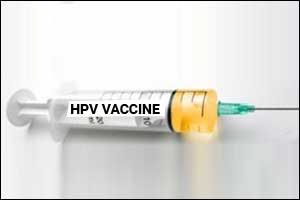- Home
- Editorial
- News
- Practice Guidelines
- Anesthesiology Guidelines
- Cancer Guidelines
- Cardiac Sciences Guidelines
- Critical Care Guidelines
- Dentistry Guidelines
- Dermatology Guidelines
- Diabetes and Endo Guidelines
- Diagnostics Guidelines
- ENT Guidelines
- Featured Practice Guidelines
- Gastroenterology Guidelines
- Geriatrics Guidelines
- Medicine Guidelines
- Nephrology Guidelines
- Neurosciences Guidelines
- Obs and Gynae Guidelines
- Ophthalmology Guidelines
- Orthopaedics Guidelines
- Paediatrics Guidelines
- Psychiatry Guidelines
- Pulmonology Guidelines
- Radiology Guidelines
- Surgery Guidelines
- Urology Guidelines
HPV Vaccine now approved for use upto 45 years

The U.S. Food and Drug Administration has agreed for expanding the approved use of the Gardasil 9 vaccine, HPV Vaccine to include women and men aged 27 through 45 years. Gardasil 9 (Human Papillomavirus (HPV) 9-Valent Vaccine, Recombinant) was approved in 2014 for use in males and females aged 9 through 26 years. Gardasil 9 prevents certain cancers and diseases caused by the nine HPV types covered by the vaccine.
According to an estimate, about 14 million Americans become infected with HPV every year. In total, about 12,000 women are diagnosed with and about 4,000 women die from cervical cancer caused by certain HPV viruses. HPV viruses are also associated with several other forms of cancer affecting men and women.
Gardasil was approved by the FDA in 2006 to prevent certain cancers and diseases caused by four HPV types. In 2014, the FDA approved Gardasil 9, which covers the same four HPV types as Gardasil, as well as an additional five HPV types.
Effectiveness of Gardasil 9 in men 27 through 45 years of age is inferred from the data described above in women 27 through 45 years of age, as well as efficacy data from Gardasil in younger men (16 through 26 years of age) and immunogenicity data from a clinical trial in which 150 men, 27 through 45 years of age, received a 3-dose regimen of Gardasil over 6 months.
The safety of Gardasil 9 was evaluated in about a total of 13,000 males and females. The most commonly reported adverse reactions were injection site pain, swelling, redness and headaches.
“Today’s approval represents an important opportunity to help prevent HPV-related diseases and cancers in a broader age range,” said Peter Marks, M.D., Ph.D., director of the FDA’s Center for Biologics Evaluation and Research. ”The Centers for Disease Control and Prevention has stated that HPV vaccination prior to becoming infected with the HPV types covered by the vaccine has the potential to prevent more than 90 percent of these cancers, or 31,200 cases every year, from ever developing.”
The effectiveness of Gardasil is relevant to Gardasil 9 since the vaccines are manufactured similarly and cover four of the same HPV types. In a study in approximately 3,200 women 27 through 45 years of age, followed for an average of 3.5 years, Gardasil was 88 percent effective in the prevention of a combined endpoint of persistent infection, genital warts, vulvar and vaginal precancerous lesions, cervical precancerous lesions, and cervical cancer related to HPV types covered by the vaccine. The FDA’s approval of Gardasil 9 in women 27 through 45 years of age is based on these results and new data on long-term follow-up from this study.
The FDA granted the Gardasil 9 application priority review status. This program facilitates and expedites the review of medical products that address a serious or life-threatening condition.

Disclaimer: This site is primarily intended for healthcare professionals. Any content/information on this website does not replace the advice of medical and/or health professionals and should not be construed as medical/diagnostic advice/endorsement or prescription. Use of this site is subject to our terms of use, privacy policy, advertisement policy. © 2020 Minerva Medical Treatment Pvt Ltd